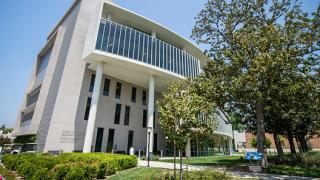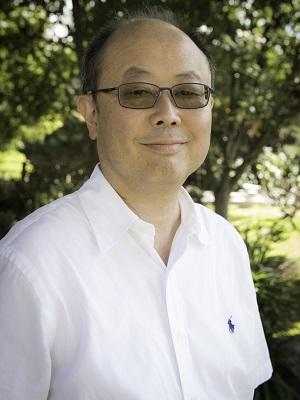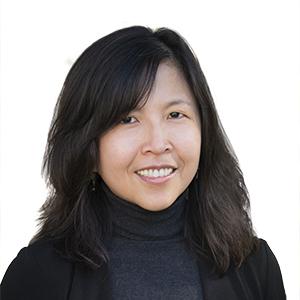Two new deans took the helm of City of Hope’s graduate program on Oct. 1, 2019, determined to attract the best and brightest students from around the nation and the globe, risk-takers who will carry the institution’s most ambitious visions for understanding, treating and curing disease into the future.
David Ann, Ph.D., dean and the Morgan & Helen Chu Dean’s Chair of the Graduate school of Biological Sciences, and Yilun Liu, Ph.D., the program’s inaugural vice dean, are new to their graduate program roles but not the institution.
Ann joined City of Hope in 2006 and is a professor and associate chair of the Department of Diabetes Complications & Metabolism and co-leader of the Molecular and Cellular Biology of Cancer Program. He has served as chair of the admissions committee of the graduate school for the last seven years (and as associate dean for admissions since 2017), taught graduate level courses, and mentored new faculty, graduate students and postdoctoral fellows. Ann is also director of the Eugene and Ruth Roberts Summer Student Academy at City of Hope.
He obtained his B.S. in medical technology from National Taiwan University and his Ph.D. degree in biochemistry from Purdue University. His research focuses on oncogenesis, metastasis and cancer metabolism.
Liu, a professor and associate chair of the Department of Cancer Genetics and Epigenetics, came to City of Hope in 2011. That year, she joined the Irell & Manella Graduate School of Biological Sciences as an associate chair and was appointed a full professor in 2018. Liu has extensive experience in teaching students at both undergraduate and graduate levels both at City of Hope and Yale University.
In 2018, Liu took on the role of associate dean and co-director of the Master of Science Program in Translational Medicine, a newly created joint educational venture between the Irell & Manella Graduate School of Biological Sciences and the Henry E. Riggs School of Applied Life Sciences at the Keck Graduate Institute.
Liu received her B.S. in biology from MIT and Ph.D. in molecular biophysics and biochemistry from Yale. Her research deals with understanding how dysfunctions in DNA replication and transcription contribute to genomic instability that leads to cancer and premature aging.
Increasing visibility
Increasing City of Hope’s graduate program’s visibility is a priority, and Ann and Liu have already instituted such simple tweaks as a more easily recognizable logo and adding a link to the graduate school (which offers both a master’s in translational medicine and a doctorate in biological sciences) to the City of Hope homepage.
“I personally didn't even know there was a graduate school until I came here,” Ann said.
“We need the outside world to know that this is a wonderful program here,” Liu concurred. “A lot of people just know about this as a hospital, a cancer center, and they don't even know about the research going on.”
Overhauling the curriculum is a top goal. “We want to train students in critical thinking, analytical skills with rigor, reproducibility and responsibility. We call these the 3R's and they are the most important things for biomedical researchers,” Ann said.
“We need to create a very innovative curriculum. Cutting-edge knowledge must be combined with state-of-art technology,” Liu added. “We need students to know that they will get the best training here to meet their future career goals.”
Academic, Clinical Are Integrated
One of the top benefits of the program is being on the same campus with the hospital, Ann said. “This is a major selling point because there's no barrier between the basic science and the clinical science. The academic and the clinical are integrated here. You feel like you are not just in graduate school. You're a part of a cancer center.”
Indeed, the program mostly appeals to students interested in cancer and/or diabetes research. “The students we attract are more interested in cancer-relevant research. They are interested in the translational approach; to apply what they learn from the basic science into disease-solving or disease care,” Liu said.
Founded in 1994 with a class of just four, the Irell & Manella Graduate School of Biological Sciences at Beckman Research Institute of City of Hope is accredited by the Western Association of Schools and Colleges (WASC). Students in the Ph.D. program have full financial support and pay no tuition.
Since conferring its first doctoral degree in 1997, the program has grown steadily to over 90 students and 110 faculty members. Currently the graduate school admits about 15 students per year, and Ann insists the quality of the student body is more important than the quantity.
Alumni work at major medical and veterinary schools, in biotech and pharmaceutical industries, and in artificial intelligence, pharmacogenomics, bioinformatics and molecular diagnostics.
New master's program
In 2018, the school added the two-year Master of Science Program in Translational Medicine jointly with the Keck Graduate Institute. This program is aimed at providing students with applied research experience an in-depth understanding of how to translate basic research into medical products from the perspectives of both academic research and downstream commercial development. The goal for the master's program is to eventually expand to 20 students, or about double its current number, Ann said.
Currently 96 students are enrolled in City of Hope’s graduate program, 87 students in the doctoral program and nine in the master’s. (With 121 faculty, that is a greater than 1-1 faculty-student ratio, which allows for “a lot of individual attention,” according to Liu.) About 75% of the students are American, while 25% are international students from Asia to Europe.
City of Hope researchers also host about 250 postdoctoral students from top-tier institutions at any one time. “The postdocs and the grad students are some of the most vibrant parts of our workforce,” said Mark LaBarge, Ph.D., director of the postdoctoral training office and a professor in the Department of Population Sciences. “They are the ones doing the most high-risk research, pushing into the unknown. They are the boots on the ground that will get us to the next treatment innovation.”
While already strong, Ann and Liu look forward to seeing the graduate program become even more robust and exciting for its young scholars. “I always enjoy working with young people,” Liu said. “It's a privilege to see young people learn, mature, then develop into a biomedical scientist or scholar.”


